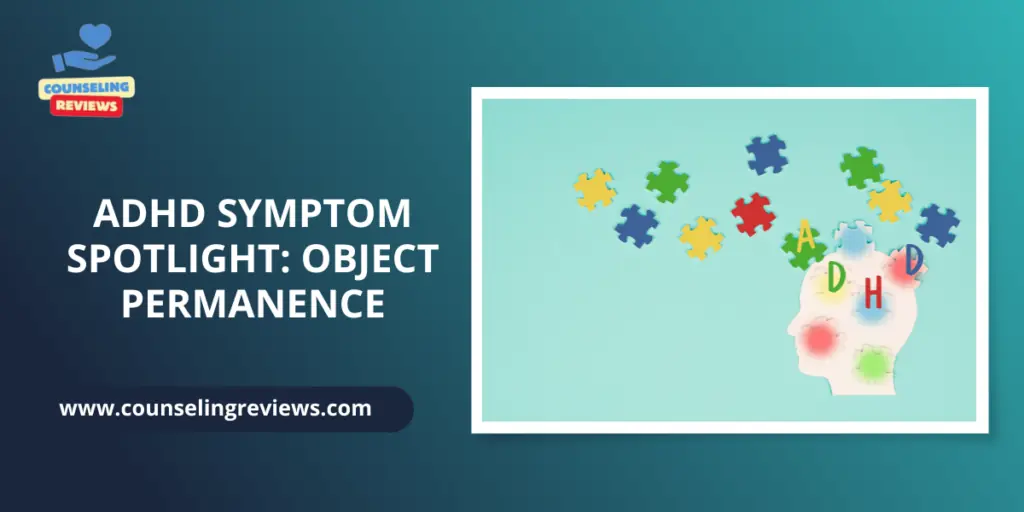ADHD is a neurodevelopmental disorder that often begins in childhood, and symptoms can continue into adulthood. People with ADHD have a difficult time paying attention, controlling their impulses, and remaining still.
Beyond these general ADHD symptoms, some people with ADHD also struggle with object permanence. Learn more about this ADHD feature below.
What is The Object Permanence Issue in ADHD?
Object permanence is a skill that develops in infants around 8 to 9 months of age. Once object permanence develops, a young child recognizes that objects continue to exist, even if they are out of sight. An infant who has developed object permanence will search for hidden toys because they recognize that the toy still exists, even when hidden.
While not an officially recognized symptom of ADHD, some people argue that children and adults with ADHD can struggle with object permanence. That means when objects are out of sight, they are also out of mind. This can lead someone with ADHD to forget about things they cannot see.
Why Does it Happen?
ADHD is a disorder of executive functioning. This means people with ADHD have deficits in important executive functioning skills, such as self-control, self-regulation, planning, and prioritizing.
Issues with object permanence occur because of the executive functioning deficits that come along with ADHD. When a person has a difficult time regulating their behavior and attending to important tasks, issues with object permanence can also occur.
For instance, a child with ADHD may forget the homework assignment tucked away in their backpack. Since they cannot see the homework assignment, they may struggle to shift their attention to their homework. Ultimately, they forget to do the assignment.
Examples of Poor Object Permanence in ADHD
Both adults and children with ADHD may appear to struggle with object permanence, meaning they may forget about tasks and items that are not currently on their mind.
This may present in the following ways:
- An adult forgets to pay a bill that they’ve received in the mail and set aside.
- Forgetting about a medical appointment that was scheduled several months in advance.
- Failing to complete an assignment on time because of forgetting about the due date.
- Losing personal items, such as coats or lunchboxes, at school.
- Misplacing a favorite toy or game.
- Losing important items, such as a wallet or car keys.
How to Know if It’s Coming From ADHD?
Everyone is forgetful from time-to-time, but in people with ADHD, forgetfulness is frequent and can interfere with daily life. So, how can you tell if your object permanence issues are coming from ADHD? If you struggle with object permanence and also demonstrate signs of ADHD, it’s likely that ADHD is to blame.
It’s important to see a mental health professional if you think you may have ADHD, because you cannot diagnose yourself. However, the following symptoms point to ADHD and suggest you should reach out to a professional for a possible diagnosis:
- Making careless mistakes when completing school work or job-related tasks
- Having a difficult time sustaining attention
- Appearing not to listen when spoken to
- Struggling to see tasks through to completion, often because of distraction
- Difficulty with organization
- Avoiding tasks that require mental focus and effort
- Losing necessary items like keys, homework, wallets, books, and paperwork
- Being easily distracted and forgetful
- Fidgeting or squirming when sitting
- Running and climbing in situations where it is inappropriate to do so
- Struggling to engage in quiet activities
- Talking excessively and blurting out answers to questions
- Being always “on the go”
- Difficulty waiting one’s turn in line
- Interrupting others’ conversations
If you experience some or many of these symptoms, you may meet the diagnostic criteria for ADHD.
Coping With Object Permanence Problems
Losing important items and struggling with forgetfulness can be challenging, but there are ways to cope. Some helpful strategies include:
- Using a planner to keep track of appointments and due dates.
- Setting alerts on your phone to remind you that an appointment or due date is approaching.
- Keep items like keys, wallets, and backpacks in a designated place so they aren’t forgotten.
- Giving children a designated homework time each day so that completing assignments becomes part of a regular routine.
- Develop routines that are followed each day (ie: the same bedtime and morning routine each day).
- Setting up automatic bill pay so that important bills are paid on time instead of forgotten.
Effects on Children
Children with ADHD can face unique challenges when they struggle with object permanence. For example, they may lose their favorite toys and experience sadness and frustration.
They can also have a hard time functioning at school, because they may forget homework or arrive at school without needed supplies. Grades may suffer when children fail to complete homework assignments.
Finally, children with ADHD may run into conflict with parents over lost items. For instance, they may lose coats, lunchboxes, and backpacks because they’ve forgotten them at school.
Effects on Adults
Adults with ADHD can also face challenges related to object permanence. They may face financial consequences if they forget to pay bills on time. For instance, they may be hit with late fees, or experience declines in their credit score, because they have simply forgotten about bills.
Adults may also forget about important appointments and deadlines. This can lead to poor job performance and reprimands at work.
Treatment Options
Fortunately, treatment is available for ADHD. Self-help strategies like creating a routine can be beneficial, but many people with ADHD also benefit from professional intervention.
For children with ADHD, medication and therapy are the recommended treatments. Medications can make it easier to attend to important tasks and control impulsive behavior. Therapy can help children to learn new skills. Parents are also involved in therapy to help them learn behavior management strategies.
Adults with ADHD can also benefit from medication and therapy. For those with a busy schedule, online therapy can be helpful. This modality allows you to connect with a therapist from the comfort of home, so you can learn ADHD management strategies.
Conclusion
Object permanence difficulties can appear in people with ADHD. When important objects, tasks, and due dates are not immediately visible, they can easily be forgotten. This occurs because ADHD leads to difficulties with sustaining attention and regulating behavior. With self-help strategies and professional support, you can learn to manage these challenges.





